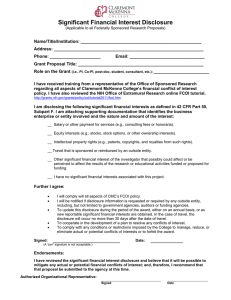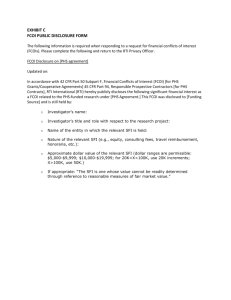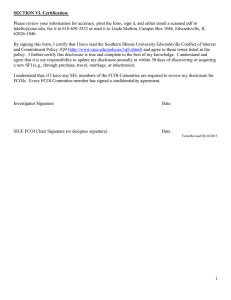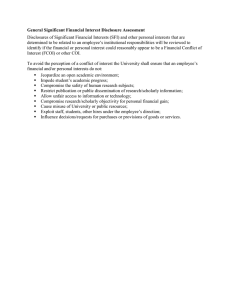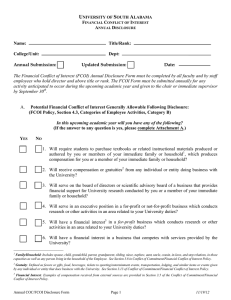1 Revised, effective as of August 24, 2012 . COLUMBIA
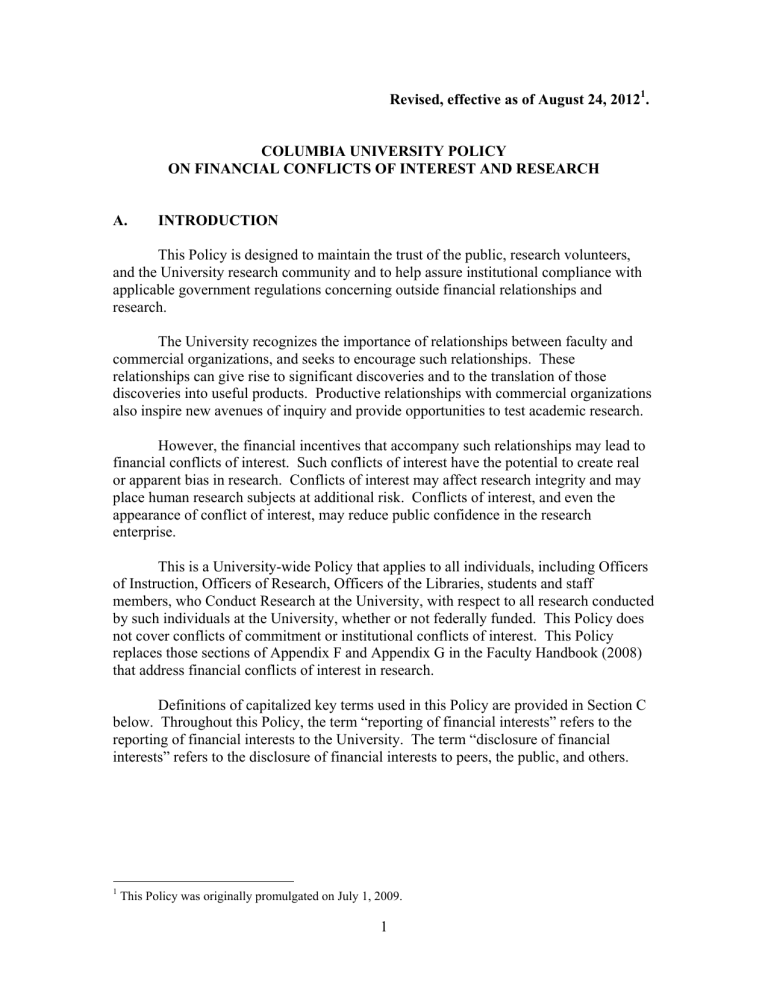
COLUMBIA UNIVERSITY POLICY
ON FINANCIAL CONFLICTS OF INTEREST AND RESEARCH
A. INTRODUCTION
This Policy is designed to maintain the trust of the public, research volunteers, and the University research community and to help assure institutional compliance with applicable government regulations concerning outside financial relationships and research.
The University recognizes the importance of relationships between faculty and commercial organizations, and seeks to encourage such relationships. These relationships can give rise to significant discoveries and to the translation of those discoveries into useful products. Productive relationships with commercial organizations also inspire new avenues of inquiry and provide opportunities to test academic research.
However, the financial incentives that accompany such relationships may lead to financial conflicts of interest. Such conflicts of interest have the potential to create real or apparent bias in research. Conflicts of interest may affect research integrity and may place human research subjects at additional risk. Conflicts of interest, and even the appearance of conflict of interest, may reduce public confidence in the research enterprise.
This is a University-wide Policy that applies to all individuals, including Officers of Instruction, Officers of Research, Officers of the Libraries, students and staff members, who Conduct Research at the University, with respect to all research conducted by such individuals at the University, whether or not federally funded. This Policy does not cover conflicts of commitment or institutional conflicts of interest. This Policy replaces those sections of Appendix F and Appendix G in the Faculty Handbook (2008) that address financial conflicts of interest in research.
Definitions of capitalized key terms used in this Policy are provided in Section C below. Throughout this Policy, the term “reporting of financial interests” refers to the reporting of financial interests to the University. The term “disclosure of financial interests” refers to the disclosure of financial interests to peers, the public, and others.
1
This Policy was originally promulgated on July 1, 2009.
1
1.
The interests of the University, its researchers, and the public are served by responsible interactions between industry and the University, with a view to stimulating and nurturing research, the development of technology, and the pursuit of other scholarly activities.
2.
The University is also committed to protecting against the risks to research integrity, human subjects and public confidence in the research enterprise that may arise from real or apparent conflicts of interest.
3.
With respect to financial conflicts of interest in research, transparency is paramount. The provisions of this Policy that require reporting of financial interests to the University apply to research sponsored by the University, as defined below.
However, this Policy also requires Individuals to disclose outside financial interests that relate to any of their research, including unfunded research, to peers and members of the public. These disclosures must be made in publications, reports, talks, or other presentations of research. The transparency requirement set forth in this Principle 3 is separate from the provisions of this Policy that address management of an actual or apparent conflict of interest.
4.
To assure that conflicts of interest relating to research sponsored by the
University are appropriately addressed, Individuals must report to the University all
Financial Interests in Businesses that:
fund the Individual’s Research;
supply products or technology that are the subject of such Research;
own or license intellectual property that is the subject of such Research; or
otherwise qualify as an Interested Business, defined below.
Individuals must also report any other Financial Interest held or received by such
Individual or his or her Family that would reasonably appear to be affected by the
Individual’s Research. These Financial Interest Reports are confidential as described in paragraph F.5 below. The accurate and complete reporting of financial interests is essential to maintain the integrity of the University and its Research, and protects researchers against allegations of undisclosed conflicts.
5.
To protect against the risks that may accompany relationships with
Interested Businesses, it is not ordinarily allowable for an Individual who has a
Significant Financial Interest in an Interested Business to Conduct Research involving that Interested Business. Nevertheless, in any particular case, the Financial Conflict of
Interest Committee may determine that countervailing circumstances exist that justify the
Conduct of Research by such an Individual.
2
6.
In the event that the Committee determines that countervailing circumstances exist, the Individual in question must disclose his/her Significant Financial
Interests to peers and the public, in accordance with Governing Principle 3. In addition, the Individual must make such disclosures: a.
to all participating investigators and appropriate members of the laboratory or research group, students, and trainees; b.
on human subject research consent forms, as determined by the
Institutional Review Board (“IRB”); and c.
to state and federal officials, as required by statute or regulation.
7.
The research assigned to students, post-doctoral fellows, trainees and other subordinates should further the University’s mission to advance knowledge and learning at the highest levels. Accordingly, without the prior approval of the Financial Conflict of
Interest Committee, no Individual may assign any student, post-doctoral fellow, trainee or other subordinate to any Research project where such Individual has a Significant
Financial Interest, through an Interested Business or otherwise.
8.
No Individual may receive any payment relating to Research that is conditioned upon obtaining a pre-determined result or achieving a successful outcome in such Research.
9.
Individuals must comply with all state and federal requirements applicable to financial interests in research, including, but not limited to, state financial disclosure laws (if applicable), state licensure and professional conduct standards, federal laws relative to “finders fees” for research subjects, and prohibitions against insider trading.
C. DEFINITIONS
1.
Business: (a) any corporation, partnership, sole proprietorship, firm, franchise, association, organization, holding company, limited liability company, trust or other for- profit commercial entity; and (b) any not-for-profit entity.
2.
Conduct Research : perform or otherwise participate in Research, including, but not limited to, the following activities: a.
designing Research; b.
directing Research; c.
enrolling Research subjects (including obtaining subjects’ informed consent); d.
collecting data; e.
making decisions related to eligibility or risks of participating in Research; f.
analyzing or reporting Research data; and g.
contributing to manuscripts concerning Research for publication
3
3.
Family : with respect to any Individual: a.
the spouse or domestic partner of such Individual; b.
the children and grandchildren of such Individual; c.
the parents and grandparents of such Individual; and d.
any trust, organization or enterprise over which such Individual, alone or together with his or her family, exercises a controlling or significant interest.
4.
Financial Interest : a financial interest in an Interested Business or any other financial interest that would reasonably appear to be related to an Individual’s institutional responsibilities, held or received by an Individual or his or her Family.
2
A
Financial Interest includes anything of monetary value, including but not limited to: a.
salary or other compensation for services (e.g., consulting fees or honoraria); b.
equity interests (e.g., stock, stock options or other ownership interests); c.
intellectual property rights (e.g., patents or copyrights); d.
royalties, license fees, or similar payments (“Royalty Payments”) from intellectual property rights, whether received directly from the Interested
Business, through the University, e.g., through a University license agreement, or received from another institution; and e.
directorships, executive roles and other special relationships with a
Business having the potential for personal material gain.
A Financial Interest does not include: a.
salary or other remuneration from the University other than Royalty
Payments; b.
income from seminars, lectures or teaching sponsored by a Federal, state or local government agency, an institution of higher education, an academic teaching hospital, a medical center, or a research institute that is affiliated with an institution of higher education; c.
income from service on advisory committees or review panels for a
Federal, state or local government agency, an institution of higher education, an academic teaching hospital, a medical center, or a research institute that is affiliated with an institution of higher education;;
2
Although Financial Interests typically exist in relation to a Business, this Policy also requires disclosure of financial interests even where no Business is involved if the financial interest could reasonably appear to relate to the Individual’s institutional responsibilities. Such financial interests could include, for example, a patent owned personally by the Individual rather than by the University or another entity.
4
d.
royalties or other income received from an independent publishing company arising out of authoring, editing or reviewing publications
(print or electronic)
3
; e.
diversified financial holdings that are not controlled, influenced or managed by the Individual (e.g., mutual funds); and f.
financial interests held by a member of the Individual’s Family but not known to the Individual, except for interests held by the Individual’s spouse or domestic partner or dependent children, which are deemed to be known by the Individual.
5.
Individual : any Officer of Instruction, Officer of Research, Officer of the
Libraries, student, fellow, research staff member or other individual who Conducts
Research at the University, including technical staff who have direct access to data or, for clinical research, human subjects, and therefore are in a position to influence the design, conduct or results of the Research and/or have non-public information as to the outcome of such Research. This term is not intended to include individuals who are purely advisory or are not sufficiently independent to be in a position to influence design, conduct or results of such Research.
6.
Interested Business : with respect to any Research conducted by an
Individual, any Business that: a.
funds such Research in whole or in part, whether through a research agreement, gift, or other arrangement; b.
supplies drugs, devices or other goods that are the subject of such
Research, or services or other deliverables in connection with the research, pursuant to a material transfer agreement, a research agreement or otherwise; c.
holds an Investigational New Drug application or Investigational Device
Exemption for a Technology being investigated in such Research; d.
owns, licenses or has any other contractual interest in a Technology being investigated in such Research; or e.
acts for or on behalf of another Interested Business, directly or indirectly.
Depending on the relationship, this could include some medical education companies and other similar entities.
7.
PHS Threshold: the threshold established from time to time by conflictof-interest regulations of the U.S. Public Health Service (42 C.F.R. Part 50, Subpart F and 45 C.F.R. Part 94) , above which a financial interest is considered “significant.”
Currently the PHS Threshold is: (i) income of $5,000; or (ii) an equity interest in a publicly traded entity that either: (a) has a value of $5,000; or (b) represents 5% ownership (see also paragraph (c) under definition of Significant Financial Interest below); or (iii) any equity interest in a private entity.
3
Individuals who propose or Conduct Research funded by the Public Health Service must disclose all
Financial Interests that relate to their institutional responsibilities, including book royalties. Accordingly, the exclusion in this sub-paragraph (d) does not apply to such individuals.
5
8.
Research : any systematic investigation designed to develop or contribute to generalizable knowledge, including all basic, applied and demonstration research in all fields of knowledge, sponsored by the University. Research sponsored by the University includes any research: (a) conducted pursuant to an agreement between the University and a third party; (b) supported by funding that is administered through the University
(e.g., through the Office of Sponsored Projects Administration (“SPA”), Columbia
Technology Ventures (“CTV”), the Clinical Trials Office, University Development and
Alumni Relations, or through an individual school, center, institute or department); or (c) requiring review by a Columbia regulatory body (e.g., the Institutional Review Board).
“Research” as defined here excludes unfunded research conducted as part of an individual’s employment at Columbia and not requiring review by a Columbia regulatory body.
9.
Significant Financial Interest : any Financial Interest that is, separately or in the aggregate: a.
salary or other income, whether for consulting, lecturing, travel, service on an advisory board or for any other purpose paid by a Business that has in the prior twelve months exceeded the PHS Threshold (currently $5,000) or is expected to exceed such amount in the next twelve months; b.
for a publicly held Business , an equity interest that exceeds the PHS
Threshold, currently: (i) $5,000 in value or (ii) representing 5% ownership in such Business; c.
for a privately held Business , any equity interest in such Business, regardless of the amount; d.
Royalty Payments, including those received under a University agreement, that in the aggregate have in the prior twelve months exceeded the PHS
Threshold or are expected to exceed the PHS Threshold in the next twelve months; e.
service as an officer, manager, member of a board of directors, or in any other fiduciary or managerial role for a Business, whether or not remunerated; or f.
any intellectual property or other property right that would reasonably appear to be affected by the Research at issue.
10.
Technology : any methodology, information, software, compound, drug, device, diagnostic, medical or surgical procedure, or composition of matter intended for public use or research.
D. COMPLIANCE WITH LAWS, REGULATIONS AND POLICIES
The University will comply with all applicable federal and state laws, regulations and policies with respect to financial conflicts of interest. These include, but are not limited to:
6
a.
U.S. Public Health Service regulations, codified at 42 C.F.R. Part 50,
Subpart F and 45 C.F.R. Part 94; and b.
Food and Drug Administration regulations, published at 21 C.F.R. Part 54.
E. FINANCIAL CONFLICT OF INTEREST COMMITTEE
1. The University will form a special University-wide standing committee (the
“FCOI Committee”) which will be responsible for setting and communicating standards with respect to financial conflicts of interest and carrying out the review and disposition of such conflicts of interest.
2. The members of the FCOI Committee will be appointed by the Executive
Vice President for Research (the “EVPR”), who shall determine the number of members required. The FCOI Committee will consist of: a.
voting members who shall comprise Officers of Instruction and Officers of
Research including: (i) representatives from schools at Columbia
University Medical Center (“CUMC Schools”) and other schools of the
University (“Non-CUMC Schools”); and (ii) representatives from the
University’s Institutional Review Boards (collectively, the “IRB”) and
Institutional Animal Care and Use Committees (collectively, the
“IACUC”); and b.
non-voting members who shall include: at least one representative of each of the Office of the General Counsel, the Office of Research Compliance and Training, the Office of Sponsored Projects Administration (“SPA”),
Columbia Technology Ventures and the Clinical Trials Office.
The EVPR will appoint one of the voting members to serve as Chair of the FCOI
Committee, and may appoint an additional voting member as Co-Chair.
3. If the FCOI Committee reviews the disclosure of an Individual who is a student or an Officer of the Libraries, the EVPR shall, upon request of the Individual, appoint a disinterested student or Officer of the Libraries, as applicable, to serve as an ad hoc voting member for that review only.
4. The FCOI Committee will have separate sub-committees (the “Sub-
Committees”) to address conflicts of interest arising out of Research conducted at CUMC
Schools and conflicts of interest arising out of Research conducted at Non-CUMC
Schools. The Sub-Committees shall be comprised of members of the FCOI Committee selected by the EVPR . The Chair of the FCOI Committee shall be the Chair of the Sub-
Committee on which he or she serves and the EVPR will select the Chair of the other
Sub-Committee from the members of such Sub-Committee.
7
F. REPORTING TO THE UNIVERSITY
1. Each Individual must report to the University all of his/her Financial
Interests at least annually on a form and in a manner approved by the EVPR (“Annual
Financial Interest Report”). The University reserves the right to request additional information and supporting documentation as needed.
2. No sponsored project application may be submitted unless each Individual who would Conduct Research under the proposal has a current Annual Financial Interest
Report on file. Similarly, no sponsored research agreement may be finalized unless each
Individual who would Conduct Research under the proposal has a current Annual
Financial Interest Report on file.
3. Prior to Conducting Research that involves human subjects, each Individual proposing to Conduct such Research must report all of his/her Financial Interests related to such Research to the University on a form and in a manner approved by the FCOI
Committee. Such Reports shall be submitted not later than the time a protocol, an application for exemption, a protocol modification or a protocol renewal relating to such
Research is submitted for review by the IRB.
4. Each Individual must promptly amend any information reported pursuant to
Sections F. 1 and F. 3 above to reflect any changed circumstances.
5. To the extent possible and as allowed by law, all Financial Interest Reports and all information and written materials provided to or produced by the FCOI
Committee shall be kept confidential and shared only with FCOI Committee members and staff, IRB members and staff, and other individuals identified case-by-case on a need-to-know basis. Members of the FCOI Committee shall sign a non-disclosure agreement to this effect upon appointment to the FCOI Committee. For clarity, this paragraph shall not be interpreted to limit the University’s ability to comply with any law or regulation requiring the University to make certain information publicly available.
G. FCOI COMMITTEE REVIEW
1. The FCOI Committee shall review all Significant Financial Interests reported to the University.
2. As set forth in Governing Principle 5, it is not ordinarily allowable for an
Individual who has a Significant Financial Interest in an Interested Business to Conduct
Research involving that Interested Business. However, in any particular case, the FCOI
Committee may determine that there are countervailing circumstances that justify allowing such an Individual to Conduct the Research (“Countervailing Circumstances”).
4
4
The “not ordinarily allowable” presumption shall not apply to Significant Financial Interests that could reasonably appear to be affected by the outcome of the research, but are not interests in Interested
Businesses. However, the same review factors set forth in Sections G(3) and (4) shall apply to the review of such interests.
8
3. In determining whether Countervailing Circumstances exist, the FCOI
Committee shall balance the potential risks to the integrity of the data, human subjects, and public safety with the potential benefits to the research community and the public at large. In conducting this review, the FCOI Committee may take the following factors into account, as applicable to the facts of the individual case: a.
Factors that may weigh against Countervailing Circumstances: i.
any potential negative impact of the Significant Financial Interest on the integrity of the applicable Research data; ii.
any risks to the rights, safety and care of any human subjects in such Research; iii.
any potential negative impact on public safety or wellbeing; iv.
any risks to the rights of and obligations to any students, fellows and trainees participating in such Research; v.
the likelihood that the Financial Interest might appear to have influenced the conduct or results of the Research; and vi.
any other circumstance consistent with Governing Principles that the FCOI Committee determines would weigh against a finding of
Countervailing Circumstances. b.
Factors that may weigh in favor of Countervailing Circumstances: i.
the availability of the results of such Research to the research community and the public; ii.
whether such Research shows the potential for significant scientific results and/or health benefits; iii.
whether such Individual has unique expertise; iv.
whether the financial interest derives from a relationship between the investigator and the Interested Business which is judged to be of unique importance or is otherwise so valuable to the public interest or the scientific enterprise as to outweigh the risks identified in this instance; v.
whether such Research is not likely to be carried out if not conducted by such Individual or the University; vi.
whether the results of such Research have limited potential to directly and predictably benefit the Interested Business; vii.
whether such Research is amenable to a plan for management and monitoring; viii.
whether the relationship giving rise to the Significant Financial
Interest has concluded; and ix.
any other circumstance consistent with the Governing Principles that the FCOI Committee determines would weigh in favor of allowing the Individual in question to Conduct the Research.
4. Special considerations arise when the Significant Financial Interest in question is Royalty Payments paid to an Individual pursuant to a University license
9
agreement. Royalty Payments paid under such an agreement are an example of a financial interest that promotes the commercialization of research for the public benefit and may be amenable to successful management. To encourage the development of new products and processes, the Bayh-Dole Act obligates institutions to attempt to commercialize inventions resulting from federally funded research and to distribute a portion of the royalty income from marketed inventions to inventors. This objective of the Act, and the potential value of the innovation to the public may, in the judgment of the Committee, justify permitting the Individual in question to conduct the Research at issue, subject to appropriate management conditions.
Accordingly, when the Significant Financial Interest under review is Royalty Payments, the following factors may be considered, in addition to factors set forth in 3(a) and (b) above: a.
the potential impact of the research on the value of the royalties to the
Individual; and b.
the value of the Individual’s continued participation in the development of the Technology.
The foregoing may not be interpreted so as to eliminate reporting obligations, limit the
Committee's ability to restrict or prohibit these arrangements, or determine what constitutes a Countervailing Circumstance.
5. After conducting its review, the FCOI Committee may make one of the following determinations: a. The FCOI Committee may determine that an Individual may Conduct such Research only if he/she divests himself/herself of the interest in question or severs the relationship that creates that interest; or b. The FCOI Committee may determine that there are Countervailing
Circumstances. In such a case, the FCOI Committee may propose a management plan
(“Management Plan”), or request such Individual to propose a Management Plan for
Committee review and approval. Such Management Plan will impose conditions or restrictions to manage, reduce or eliminate the actual or apparent conflict of interest, in addition to the disclosure required under Governing Principle 3. Such a Management
Plan may include but is not limited to such conditions as: i.
limiting the role of the Individual by, among other things, prohibiting such Individual from: (a) serving as principal investigator; (b) analyzing data; (c) determining whether potential human subjects are eligible for enrollment; (d) soliciting consent of potential human subjects; or (e) determining whether an adverse event report is required; and/or
10
ii.
providing oversight by, among other things, appointing a disinterested individual or group to monitor aspects of the relevant
6.
Research activity, such as study design or human subjects accrual.
The FCOI Committee will document its findings and the basis for its decision with respect to any Research. If such Research involves human subjects, such documentation will be made available to the IRB.
7. If the FCOI Committee has determined that either a Management Plan or divestiture or elimination of the conflict of interest is required with respect to any
Research, the applicable Individual must notify the FCOI Committee in writing that he/she has taken the steps required by the FCOI Committee prior to conducting such
Research, including making all required disclosures to members of the research team.
8. No Individual may Conduct Research with human subjects with respect to which he/she has a Significant Financial Interest until any real or perceived conflict of interest is reduced, managed, or eliminated to the satisfaction of the IRB. The IRB may impose more, but not less, stringent requirements than the FCOI Committee.
9. Each Sub-Committee may develop precedents and standard operating procedures for handling particular COI issues, and may expedite review for subsequent cases involving those issues. To help ensure consistency, a representative of the
University office responsible for administering the FCOI Committee ( i.e.
, the Office of
Research Compliance and Training) and the Chair/co-Chair of each Sub-Committee should attend all meetings; and members may rotate between Sub-Committees. If inconsistent precedents develop, then the rationale for the inconsistency shall be documented.
10. The entire FCOI Committee shall meet at least once annually. Issues involving institution-wide policy or inter-school research collaborations shall be referred to the FCOI Committee as a whole. The FCOI Committee will coordinate as needed with other University and school committees or individuals that address conflict-of-interest issues.
H. ENFORCEMENT
1. The FCOI Committee will review all reported breaches of this Policy, including: (a) failure to make required reports and disclosure(s); (b) the provision of incomplete or inaccurate information in any disclosure; (c) failure to update a disclosure when required to do so; (d) non-compliance with a Management Plan; or (e) noncompliance with any other directive of the FCOI Committee.
2. If the FCOI Committee concludes that a breach of this Policy has occurred, it will so notify the applicable Individual(s) in writing and such Individual(s) will be given the opportunity to respond in writing or in person to the FCOI Committee and take corrective action within a reasonable time period, which is typically 30 days but may be
11
longer or shorter depending on the circumstances. If such corrective action is not taken within the specified time period, the FCOI Committee may recommend one or more of the sanctions described in Section J below.
I. APPEAL
1. The FCOI Committee may reconsider on a timely basis a determination upon timely submission by an Individual of new and relevant information.
2. An Individual may appeal a FCOI Committee determination by submission of a timely notice of appeal to the EVPR. Where appropriate, the EVPR may consult with the applicable dean or director and, for individuals in the Health Sciences, with the Executive Vice President for the Health Sciences. The decision of the EVPR shall be final in all respects.
J. SANCTIONS
1. The EVPR, in consultation with the applicable dean or director, may impose sanctions and disciplinary actions on any Individual for failure to comply with this Policy, including the following: a. inclusion in such Individual’s personnel file of a letter from the standing at the University has been called into question, i.e., censure; b. ineligibility of such Individual to (i) submit an application for funding to Sponsored Projects Administration; (ii) enter into any technology transfer agreement; (iii) submit a protocol to the IRB or the
IACUC; (iv) Conduct Research; (v) teach; or (vi) supervise graduate students; c. non-renewal of appointment; and d. in egregious circumstances, recommendation of dismissal from the
University.
2. No penalty involving dismissal from the University or other serious sanction may become effective except in accordance with the provisions of the
University’s Code of Academic Freedom and Tenure.
12
